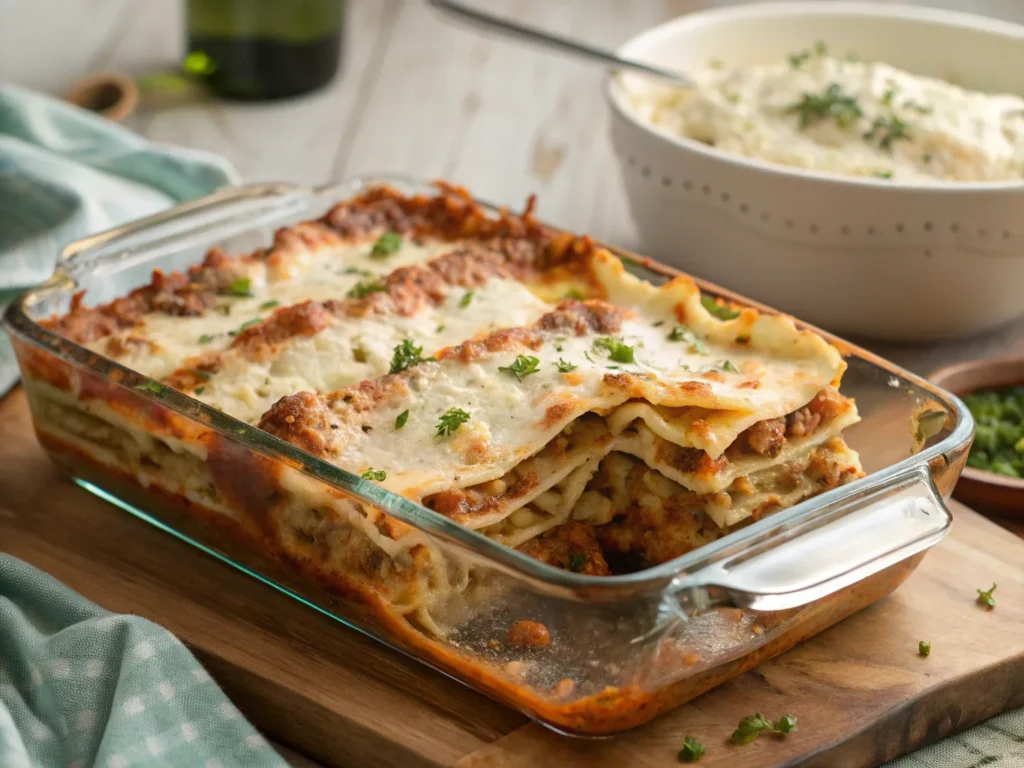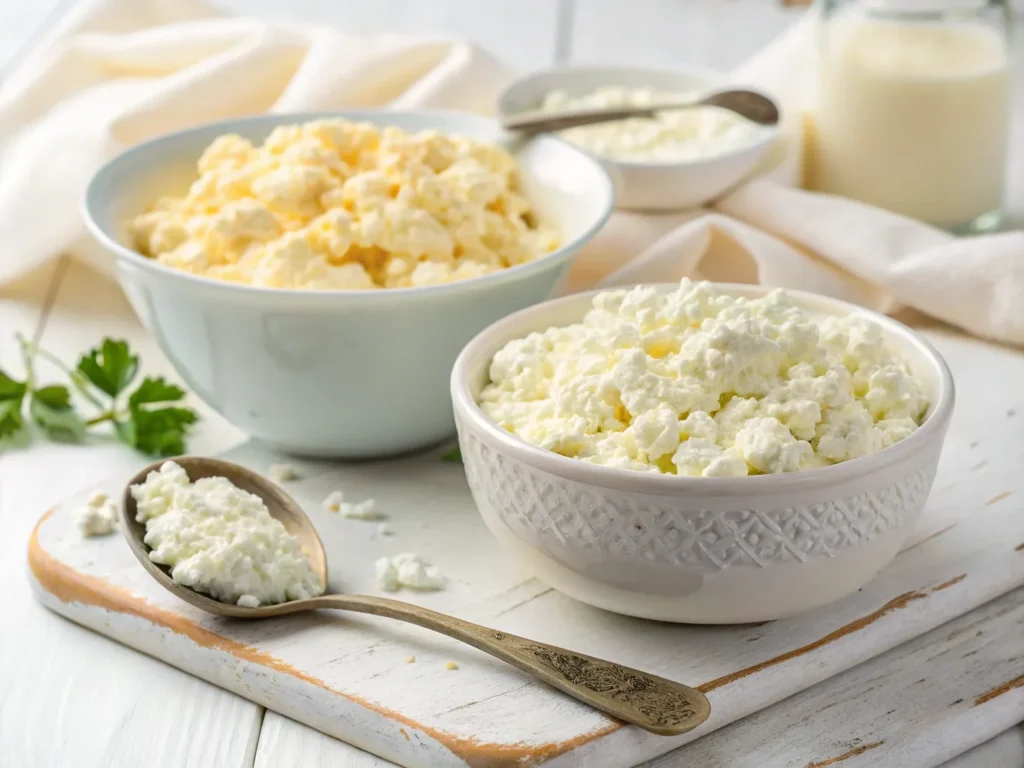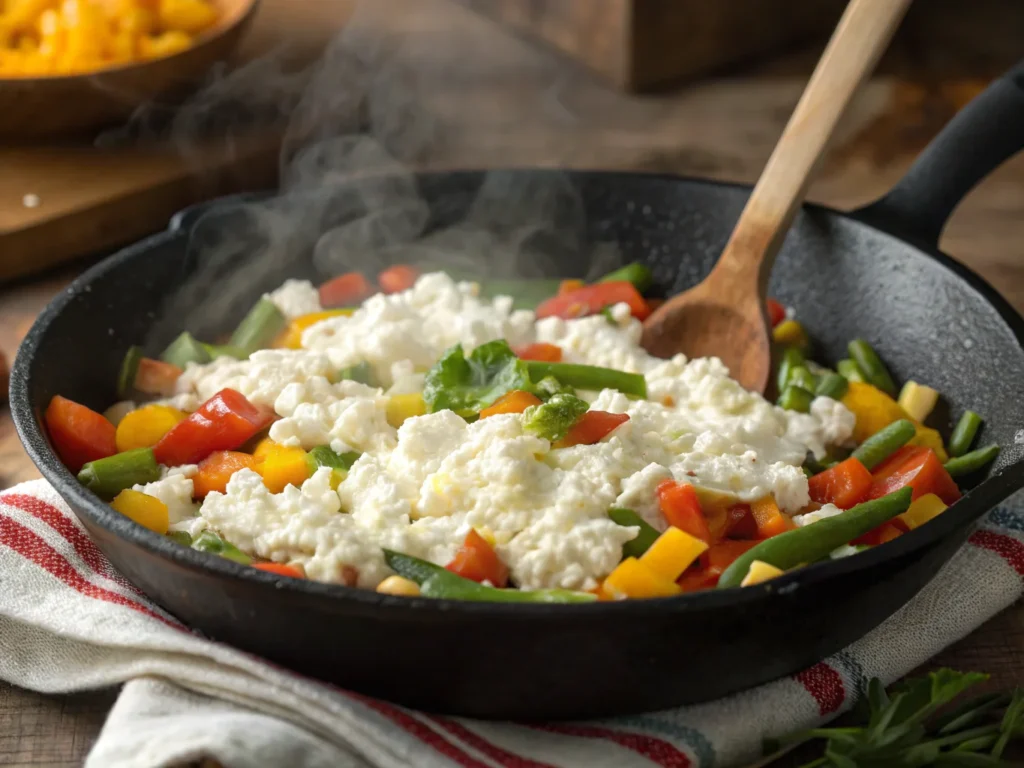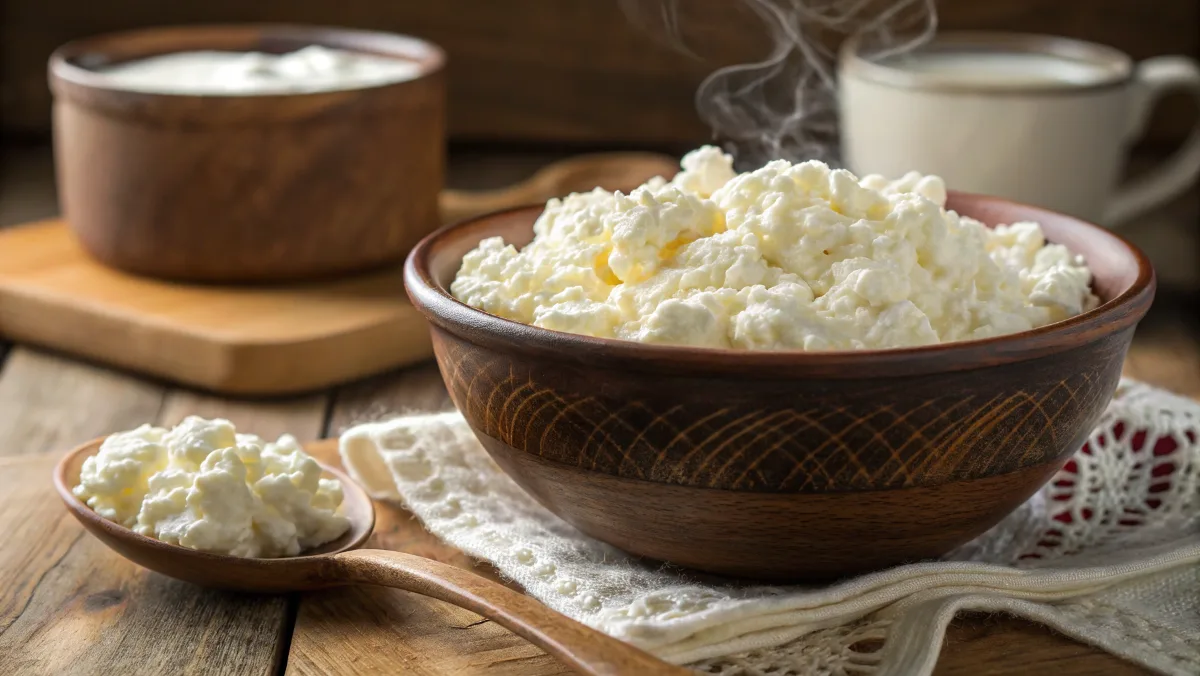Introduction
Does cooking cottage cheese affect protein? Many health-conscious individuals and food enthusiasts wonder about the effects of heat on the protein content of cottage cheese. This article delves into the science of cooking cottage cheese and answers the pressing question: Does cooking cottage cheese affect protein? Cottage cheese is celebrated for its high protein content, but many wonder if heating it compromises its nutritional value. In this article, we’ll explore the science of cooking cottage cheese, the impact of heat on its protein, and how to retain its benefits in your recipes.
Want to explore more about heating cottage cheese? Find the facts and benefits here.
Table of Contents
Nutritional Overview of Cottage Cheese
Cottage cheese is a powerhouse of protein, but many wonder: Does cooking cottage cheese affect protein? This versatile ingredient retains its nutrients even when exposed to moderate heat, making it ideal for both raw and cooked recipes.
Why Cottage Cheese is a Protein Powerhouse
Cottage cheese is a rich source of casein protein, known for its slow digestion and muscle-repairing benefits. A typical cup provides about 28 grams of protein, along with essential amino acids that the body cannot produce on its own.
Does Cooking Cottage Cheese Affect Nutritional Value?
Beyond protein, cottage cheese boasts an impressive nutrient profile, including calcium, phosphorus, selenium, and B vitamins. Its low calorie yet high-protein content makes it an excellent choice for weight management and muscle recovery.
Cottage cheese also contains probiotics, promoting gut health—a bonus for those seeking to improve digestion.
The Science of Cooking Proteins
To address the question, ‘Does cooking cottage cheese affect protein?,’ we need to understand how heat impacts proteins. While denaturation occurs, the protein’s amino acids remain intact and bioavailable.
What Happens to Protein When Cottage Cheese is Heated?
Does cooking cottage cheese affect protein? Heat does not destroy the amino acids in cottage cheese, even when the protein structure changes.
When proteins are exposed to heat, they undergo a process called denaturation. This means the protein molecules unravel and change shape. While this may sound like a loss of nutrition, denaturation does not affect the protein’s ability to provide amino acids, which remain intact and beneficial.
In cottage cheese, the denaturation of casein proteins might cause slight textural changes, but the nutritional content remains unaltered.
Does Cooking Cottage Cheese Affect Protein Structure?
Many people think that heating protein reduces its effectiveness, but this is a myth. Studies confirm that the body can absorb and utilize denatured proteins just as effectively as raw proteins. In fact, cooking can make some proteins easier to digest, as heat breaks down the protein structure, allowing enzymes to access and process them more efficiently.
Does Cottage Cheese Lose Nutrients When Heated?
Impact of Heat on Protein in Cottage Cheese
Cooking cottage cheese might alter its structure, but does it compromise the protein? The short answer is no. Proteins in cottage cheese, primarily casein, remain intact when exposed to moderate heat. While denaturation occurs, it doesn’t equate to protein loss. Instead, the amino acids that make up the protein stay available for your body to absorb and utilize.
However, extreme heat over prolonged periods can cause slight nutrient degradation, especially in heat-sensitive compounds like certain vitamins. For example, vitamin B12, found in cottage cheese, may degrade if heated excessively.
Can Cooking Change the Protein Content of Cottage Cheese?
Minerals like calcium and phosphorus, vital for bone health, are highly heat-stable and remain unaffected during cooking. While some vitamins may be slightly reduced, the overall nutritional value of cottage cheese is largely retained.
For optimal nutrient retention, it’s best to cook cottage cheese over low to medium heat or incorporate it into recipes that require minimal cooking time.

Delicious lasagna made with protein-rich cottage cheese.
What Happens If You Cook Cottage Cheese?
Cooking alters the texture of cottage cheese, but does cooking cottage cheese affect protein? The answer lies in the heat’s effect on the protein structure, which changes its form but not its nutritional value.
Texture Changes: Does Cooking Cottage Cheese Affect Protein?
When heated, cottage cheese undergoes a noticeable transformation. Its creamy texture may become firmer or curd-like, depending on the temperature and cooking method. This is why it works beautifully in baked dishes like lasagna or casseroles, where it contributes a slightly chewy texture while maintaining its rich flavor.
If you’ve ever added cottage cheese to a sauce or soup, you’ve likely noticed how it blends seamlessly, adding creaminess without overwhelming the dish.
How Cooking Cottage Cheese Impacts Digestibility
Cooking cottage cheese can enhance its digestibility. Heat helps break down the protein structure, making it easier for digestive enzymes to access and process. For individuals with sensitive stomachs, this can make cooked cottage cheese a preferable option compared to its raw counterpart.
Looking for creative meal ideas? Check out this amazing orange chicken recipe.
Does Cooking Cheese Remove Protein?
Breaking the Myths About Cottage Cheese and Protein Loss
One common misconception is that cooking removes or destroys protein in cheese, including cottage cheese. In reality, the protein in cottage cheese is not lost but simply changes its structure through denaturation. This process, which unfolds and rearranges the protein molecules, does not reduce the protein content or its nutritional value.
Scientific studies confirm that cooking doesn’t diminish the quantity of protein in cheese. Instead, denatured proteins remain intact in terms of their amino acid content, ensuring that your body can still derive the same nutritional benefits.
The Truth About Protein Retention in Cooked Cottage Cheese
The casein protein in cottage cheese is particularly resilient to heat. Even when exposed to moderate or high temperatures, it retains its nutritional integrity. This makes cottage cheese a reliable protein source, whether consumed raw or cooked.
To preserve the best qualities of cottage cheese, avoid prolonged cooking at extremely high temperatures, which might alter its texture more than necessary. Low to medium heat is ideal for retaining its creamy consistency while keeping all its protein intact.

Does Protein Break Down When Cooked?
Cooking proteins in foods like cottage cheese leads to denaturation, but it’s crucial to note that this doesn’t affect the nutritional question: does cooking cottage cheese affect protein?
Understanding Denaturation in Cottage Cheese Proteins
Cooking cottage cheese doesn’t destroy protein; it denatures it. Denaturation involves the unraveling of protein molecules, altering their shape but not their nutritional content. Your body digests denatured and non-denatured proteins in the same way, breaking them down into amino acids to support muscle repair, immune function, and other essential processes.
Why Cooking Doesn’t Decrease Protein in Cottage Cheese
Yes, cooked protein remains just as beneficial as raw protein. In some cases, cooking may even improve protein digestibility. For instance, heat can make casein easier to break down, ensuring better absorption of amino acids.
As long as the protein is consumed within a balanced diet, cooked cottage cheese can effectively contribute to your daily protein requirements, whether it’s in baked dishes or as a warm topping for vegetables.
Do You Lose Protein When You Cook Cottage Cheese?
The Effects of Heat on Cottage Cheese Protein
A major concern for many is whether cooking cottage cheese leads to protein loss. The good news is that you don’t lose protein when you cook cottage cheese. While cooking causes denaturation, which changes the protein’s physical structure, the amount of protein remains constant. Denaturation simply alters the arrangement of amino acids without affecting their availability or nutritional benefits.
Cooking cottage cheese also doesn’t make its protein unusable by the body. Instead, the denatured proteins are often easier to digest and absorb, making them just as effective in providing the building blocks your body needs for muscle repair, hormone production, and other essential functions.
Does Cooking Cottage Cheese Affect Protein Availability?
To maximize nutritional retention, it’s best to cook cottage cheese using gentle methods such as baking, simmering, or steaming. Overcooking or using very high temperatures can cause excessive textural changes but won’t impact the protein content.
Here are a few examples of optimal cooking methods:
- Adding cottage cheese to baked dishes like lasagna or stuffed pasta.
- Incorporating it into sauces or soups at low heat to prevent curdling.
- Using it as a creamy topping for vegetables or casseroles.
By choosing these methods, you can enjoy the flavor and texture of cooked cottage cheese without compromising its high protein content.
What Does Heat Do to Proteins in Cheese?
How Heat Changes Cottage Cheese Proteins
When cheese, including cottage cheese, is exposed to heat, its proteins undergo a process called denaturation. This process alters the structure of the proteins, causing them to unravel and reform in different ways. While this may change the cheese’s texture—making it firmer or more elastic—it does not destroy the proteins or reduce their nutritional value.
In cottage cheese, casein proteins are particularly heat-tolerant. As a result, they retain their amino acid content even after cooking. The visual changes you observe, such as curdling or firming, are purely structural and have no impact on the protein’s ability to benefit your body.
Does Heating Cottage Cheese Reduce Protein Benefits?
Heat plays a critical role in how cottage cheese performs in recipes:
- Texture Enhancements: Heat can help create new textures, such as making the cheese creamy when stirred into sauces or soups, or slightly firm when baked in lasagna or casseroles.
- Flavor Development: Cooking can also enhance the flavors of cottage cheese by blending it with spices, vegetables, or other ingredients.
- Nutritional Versatility: Cottage cheese retains its protein content in any form, making it a versatile addition to both raw and cooked dishes.
By understanding how heat transforms cottage cheese, you can use it more effectively in recipes while ensuring it remains a healthy, protein-rich ingredient.
For a unique twist, learn creative ways to enjoy sour green grapes.

Cooking cottage cheese with vegetables for a protein-rich meal.
FAQs
Does Cottage Cheese Lose Nutrients When Heated?
Heating cottage cheese might slightly reduce certain heat-sensitive vitamins, such as vitamin B12. However, the protein and most minerals like calcium and phosphorus remain unaffected. Cooking at moderate temperatures minimizes any nutrient loss, ensuring the cheese stays nutritious.
What Happens If You Cook Cottage Cheese?
Cooking cottage cheese causes its proteins to denature, leading to changes in texture and consistency. It may become firmer or curd-like, depending on the heat and cooking method. Despite these changes, the nutritional value, especially its protein content, remains intact.
Does Cooking Cheese Remove Protein?
No, cooking doesn’t remove or destroy protein in cheese. The proteins may denature due to heat, but this only alters their structure—not their quantity or nutritional quality.
Does Protein Break Down When Cooked?
Proteins denature during cooking, meaning their molecular structure changes. This process does not break down the protein into less useful forms; instead, it can enhance digestibility, making it easier for the body to absorb.
Do You Lose Protein When You Cook Cottage Cheese?
No, cooking cottage cheese does not result in protein loss. The protein remains available and effective in supporting muscle repair, immune function, and other bodily processes.
What Does Heat Do to the Proteins in Cheese?
Heat denatures the proteins in cheese, altering their structure and texture. This process is what creates the melting or curdling effect in recipes, but it does not reduce the protein’s nutritional value.
Conclusion
Does cooking cottage cheese affect protein? The answer is simple: Heat changes its texture but not its protein content. Cottage cheese remains a reliable, protein-rich choice for both raw and cooked dishes
Cottage cheese is a versatile, protein-packed food that holds its nutritional value, even when cooked. While heat alters its structure through a process called denaturation, the protein content remains unchanged and fully functional. This makes cottage cheese a reliable source of protein for muscle repair, immune support, and overall health, whether consumed raw or incorporated into cooked dishes.
Cooking can also enhance the digestibility of cottage cheese, making its amino acids more accessible for absorption by the body. The textural transformations, from creamy to firm or curd-like, open up a world of culinary possibilities. From lasagnas to soups, cottage cheese adapts beautifully to a variety of recipes without losing its nutritional edge.
While some heat-sensitive vitamins like B12 might degrade slightly, minerals like calcium and phosphorus stay intact, ensuring cottage cheese remains a nutrient-rich choice. To preserve its benefits, cook it at low to moderate temperatures and incorporate it into recipes that don’t require prolonged exposure to heat.
Whether you enjoy it fresh, baked, or mixed into your favorite dishes, cottage cheese delivers both nutrition and versatility. Use it confidently, knowing that its protein power remains untouched by cooking.
Curious about more tips on cottage cheese? Discover the full details here.

